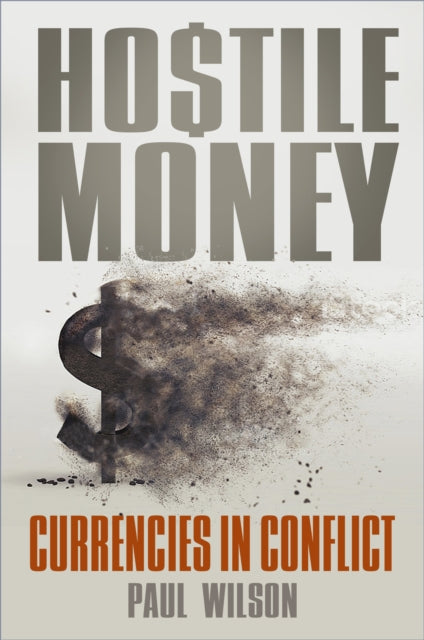Paul Wilson
Hostile Money: Currencies in Conflict
Hostile Money: Currencies in Conflict
YOU SAVE £4.86
- Condition: Brand new
- UK Delivery times: Usually arrives within 2 - 3 working days
- UK Shipping: Fee starts at £2.39. Subject to product weight & dimension
Bulk ordering. Want 15 or more copies? Get a personalised quote and bigger discounts. Learn more about bulk orders.
Couldn't load pickup availability
- More about Hostile Money: Currencies in Conflict
Money has the power to make nations and fuel wars, as seen in Germany's hyperinflation following the First World War. "Hostile Money" explores the impact of war and revolution on national currencies, including the Roman civil war, the twenty-first-century invasions of Afghanistan and Iraq, and economic sanctions and cyberwarfare.
Format: Paperback / softback
Length: 288 pages
Publication date: 23 May 2019
Publisher: The History Press Ltd
Money holds immense power, capable of shaping nations and igniting wars. It serves as both a subject of diplomacy and a tool in the hands of individuals seeking to overthrow hostile regimes both domestically and internationally. One notable example of the devastating consequences of war on currency is Germany's hyperinflation following the First World War. However, it is important to note that hyperinflation during conflicts is not limited to Germany's experience.
Hostile Money delves into the profound impact of war and revolution on national currencies, spanning from the civil war in Rome in the first century BC to the twenty-first-century invasions of Afghanistan and Iraq by American-led forces and the economic sanctions and cyberwarfare of today.
Throughout history, war has often led to the depreciation of national currencies due to various factors such as destruction of infrastructure, economic disruption, and political instability. In the case of Germany after the First World War, the Weimar Republic faced severe hyperinflation, with prices soaring uncontrollably. This phenomenon resulted from a combination of factors, including the loss of territories, the implementation of war reparations, and the printing of excessive amounts of money to pay for military expenses.
Hyperinflation not only caused widespread economic suffering but also had far-reaching political consequences. It eroded trust in the government and led to social unrest and political instability. People lost their savings and were unable to purchase basic necessities, which further exacerbated the economic crisis.
The impact of war on currency extends beyond the immediate aftermath of conflict. It can have long-term consequences for economic development and stability. For example, hyperinflation can lead to a loss of foreign investment, as investors become hesitant to invest in a country with a unstable currency. It can also hinder economic growth by creating a climate of uncertainty and instability.
In addition to the economic and political consequences, war also has social and humanitarian implications. It leads to displacement of populations, loss of human lives, and the destruction of infrastructure. These factors can have long-lasting effects on a country's social and economic well-being, particularly for vulnerable communities.
To mitigate the impact of war on currency, countries need to implement sound economic policies and strategies. This includes maintaining a stable currency, implementing fiscal discipline, and promoting economic growth through investment and innovation.
Furthermore, international cooperation is crucial in addressing the issue of war-induced hyperinflation. Countries should work together to promote stability, reduce conflict, and provide humanitarian assistance to affected populations.
In conclusion, money has the power to shape nations and fuel wars. The example of Germany's hyperinflation following the First World War serves as a stark reminder of the devastating consequences of war on currency. However, it is important to recognize that hyperinflation during conflicts is not limited to Germany's experience. Hostile Money explores the profound impact of war and revolution on national currencies, highlighting the need for sound economic policies, international cooperation, and humanitarian efforts to mitigate the impact of war on currency and promote stability and prosperity.
Weight: 454g
Dimension: 157 x 232 x 23 (mm)
ISBN-13: 9780750990790
This item can be found in:
UK and International shipping information
UK and International shipping information
UK Delivery and returns information:
- Delivery within 2 - 3 days when ordering in the UK.
- Shipping fee for UK customers from £2.39. Fully tracked shipping service available.
- Returns policy: Return within 30 days of receipt for full refund.
International deliveries:
Shulph Ink now ships to Australia, Belgium, Canada, France, Germany, Ireland, Italy, India, Luxembourg Saudi Arabia, Singapore, Spain, Netherlands, New Zealand, United Arab Emirates, United States of America.
- Delivery times: within 5 - 10 days for international orders.
- Shipping fee: charges vary for overseas orders. Only tracked services are available for most international orders. Some countries have untracked shipping options.
- Customs charges: If ordering to addresses outside the United Kingdom, you may or may not incur additional customs and duties fees during local delivery.


